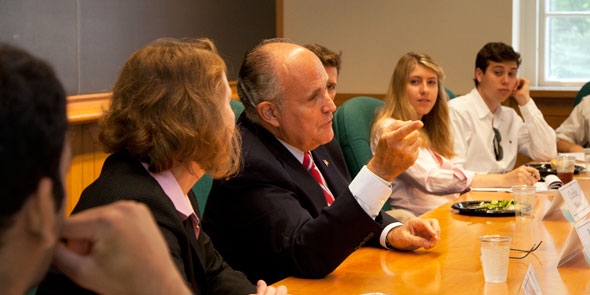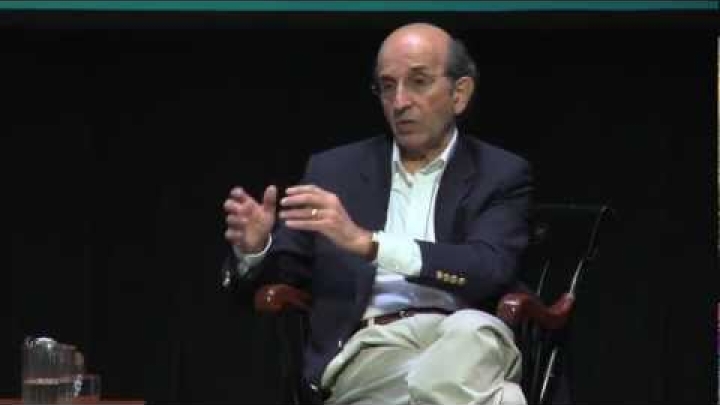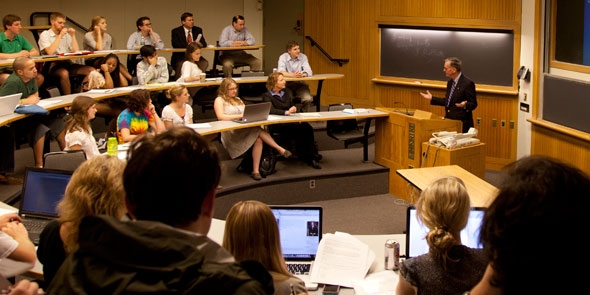A group of sophomores this summer have front row seats in a new course bringing national policy makers and politicians to campus. The leaders—including presidential candidates, current and former members of Congress, brand-name executives, and high-level government appointees—meet with students and many also deliver a public lecture.

The course is academically rigorous—and well worth the time, says Grant Warren ’13, of Woodinville, Wash.
“It’s too good an opportunity to pass up,” he says. The access he and his classmates have to prominent national leaders “is like nothing else” he’s experienced at Dartmouth.
Visitors have included Treasury Secretary Tim Geithner ’83, Senator Rob Portman ’78 (R-Ohio) and former Senator Judd Gregg, (R-N.H.). Students saw former Louisiana Governor Buddy Roemer, a Republican, declare his candidacy for the presidency. Less than a week later they heard from Republican candidates Gary Johnson, a former governor of New Mexico, and Jon Huntsman Jr., the former ambassador to China and former Utah governor. They also got to question former New York City Mayor Rudy Giuliani, who is testing the waters for a possible presidential bid.
“This is a case where the world really is our classroom,” says Associate Professor Deborah Jordan Brooks, one of those teaching the team-taught public policy course. “And that is really exciting, for students and professors alike.”
Students have also heard from Dartmouth President Jim Yong Kim and Joel Klein, the former chancellor of New York City public schools who currently works at News Corp., where he is heading up the company’s internal phone hacking investigation.
Still to come are speakers Robert Reich ’68, the former secretary of the U.S. Department of Labor and Dartmouth trustee emeritus; Senator Jeanne Shaheen, (D-N.H.); Henry Paulson ’68, former secretary of the U.S. Department of the Treasury; Jeffrey Immelt ’78, chief executive officer of GE and a Dartmouth trustee; and Frank Newport, Gallup editor-in-chief.
“It’s one of the most challenging courses I’ve taken at Dartmouth,” says Amanda Wheelock ’13, of Chattanooga, Tenn. “I’m learning stuff I’ve never even thought of before.”
Students taking the course, called “Contemporary Issues in American Politics and Public Policy,” and attending the “Leading Voices in Politics and Policy” lecture series say the experience has made them believe they can have an impact on policy formation and on picking the country’s next leaders.
President Kim, a public health physician who spoke to students and also delivered a public lecture on health-care reform, says the series has given students—and the larger community—“an amazing opportunity to hear from a diverse and influential group.”
Kim’s speech drew retired Claremont, N.H., teachers Sally and John Stoughton ’55 to Dartmouth. “This health situation is a big issue today and we wanted a chance to hear President Kim,” John Stoughton says.
Kim says he’s been impressed by students’ level of engagement and understanding of the intricacies of the reform issue. “This course and the lecture series gives students a look at the challenges they’ll face as our next generation of leaders,” he says.
Another of the course teachers, Professor Bruce Sacerdote ’90, who holds the Richard S. Braddock 1963 Professorship in Economics, says Leading Voices speakers “are addressing five or six of the biggest challenges facing our nation. We hope this experience will lead students to become more active citizens, more engaged researchers, and perhaps in some cases to enter public life themselves.”
Drew Vera ’13, a Navy veteran from Phoenix, Ariz., says he’s grateful Dartmouth has been able to attract such a top-flight lineup. And, he said, the speaker classroom visits allow students to interact on an intimate level.
Each week the lecture series attracts hundreds of area residents, including many local alumni, some of whom say the talks remind them of the Great Issues course, which was mandatory for all seniors under then-President John Sloan Dickey. Dickey started the course in 1947 and it ran for two decades.
“I wish I could be a student in this class,” says Bill Obenshain ’62, of New London, N.H., who was recently in town for a speech. “This takes a page out of the Great Issues book.”
Bob Danziger ’56, of West Hartford, Vt., says the lecturers “are major players. What an opportunity to see these people—in Hanover.”
Danziger adds that he hopes that through the course and lectures, students will learn that “public policy is a vital part of an education.”

Chuck Reilly ’53, of Hanover, says the course may get students interested in politics, as the Great Issues course did for him. “It really opened my eyes, and a lot of my classmates’ eyes, to what was going on in the real world—other than your next exam.”
The new course is sponsored by the Nelson A. Rockefeller Center for Public Policy and the Social Sciences, and the lecture series is sponsored by the Office of the President.
“We at the Rockefeller Center are pleased to have helped develop what I hope will become a recurring lecture series, with other centers at Dartmouth sponsoring courses integrated with a lecture series on international, scientific, or artistic themes,” says Rockefeller Center Director Andrew Samwick, the Sandra L. and Arthur L. Irving ‘A72, P’10 Professor of Economics, who is also teaching the course. “We are very grateful to Professor Charlie Wheelan and to President Kim and his staff for their commitment to launch this unique learning opportunity for Dartmouth students.”
Wheelan ’88, a visiting professor from the Harris School at the University of Chicago, says having the lecturers in class gives students “a chance to ask questions, to push back, or to otherwise engage in a way that they can’t in a large public forum. It’s more of a dialogue than a speech, which is a great way to gain a depth of understanding on these complex policy issues.”
“There was one particular moment when I knew we had achieved what we had set out to do with the class,” Wheelan continues. “We were waiting for Rudy Giuliani to come in and speak when I heard two students arguing about President Kim’s health-care presentation, which had been the day before. That was a sign to me that they weren’t just listening to talks by famous people, they were really trying to digest the content.”